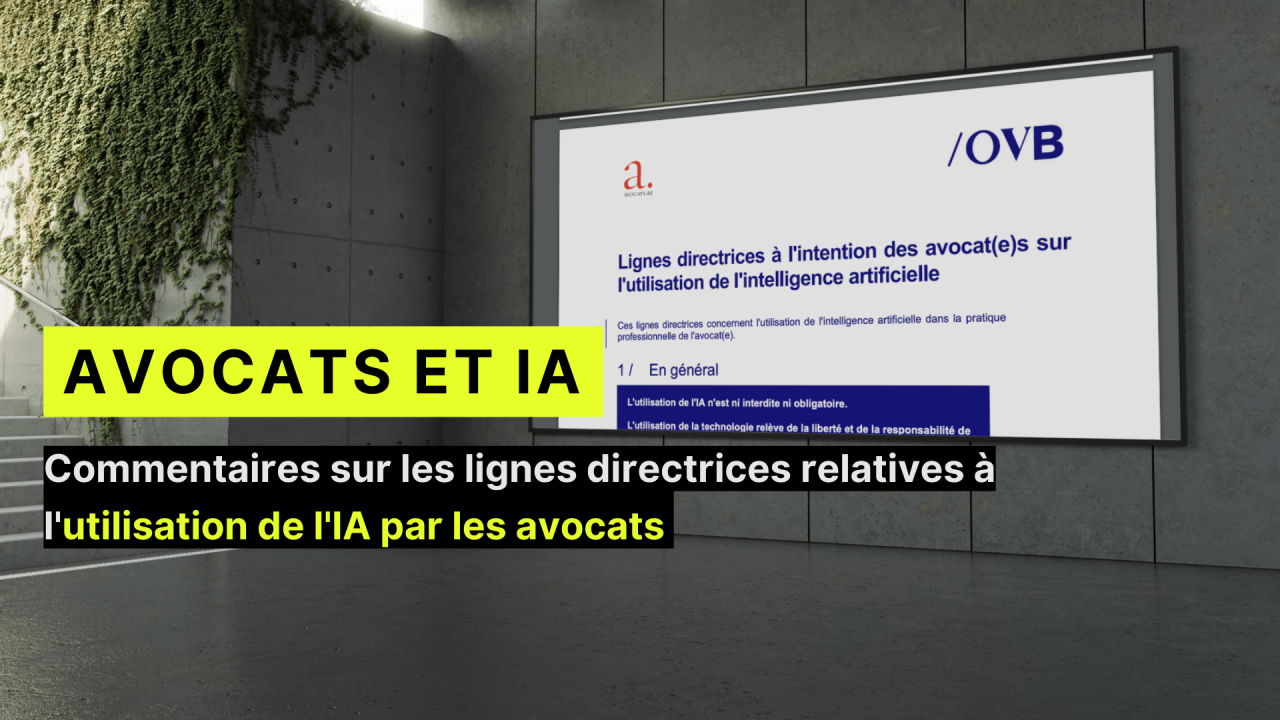The guidelines on the use of artificial intelligence by lawyerspublished by Avocats.be and theOVB on January 31, 2025, represent an important step forward in the use of these technologies.
Here’s our analysis and recommendations for developing this framework further.
The strengths of the guidelines
A quest for balance
The guidelines strike a balance between innovation and ethical framework, giving lawyers the freedom to explore AI while reminding them of their fundamental responsibilities.
Highlights:
- Raising awareness of the risks of AI models, especially LLMs
- Enhanced protection of professional secrecy
- Harmonization of practices between Belgian Bars
- Pragmatic approach to responsible innovation
7 recommendations for deepening AI guidelines for lawyers
1. Refining the distinction between AI tools
Issue: Not all AIs are equal in terms of safety and functionality.
Solution: Create a clear classification distinguishing between :
- Generic tools (ChatGPT, Claude, Perplexity …)
- Specialized legal solutions
- Autonomous AI agents
- Retrieval-Augmented Generation (RAG) tools
2. Specify safety conditions
Issue: The notion of a “closed environment with adequate safeguards” remains unclear.
Solution: Set minimum standards for :
- Local vs. cloud hosting
- Data encryption
- Access traceability
- Contractual warranties
3. Propose evaluation criteria
Issue: Lawyers lack guidance when choosing their tools.
Solution: Develop an evaluation grid covering :
- Safety level
- Reliability of results
- RGPD Compliance
- Costs and pricing models
4. Validation methodology
Issue: How can we ensure the quality of the results produced by AI?
Solution: Set up a validation protocol including :
- Systematic double-checking
- Checking quoted sources
- Process traceability
- Decision documentation
5. Rethinking billing
Issue: AI is fundamentally transforming the economics of legal services.
Solution: Anticipate the move towards :
- Value-added billing
- Service categorization (human/assisted/automated)
- Transparency on the use of AI
6. Mandatory further training
Issue: The rapid evolution of AI requires constant updating of skills.
Solution: Implement :
- AI training program for lawyers
- Certifications by legal specialty
- Organized technology watch
- Sharing best practices
7. Encourage innovation
Challenge: Go beyond the defensive approach to harness the potential of AI.
Solution: Promote :
- Supervised experimentation
- Sector case studies
- Firm support
- Measuring productivity gains
Essential definitions to be clarified
Missing technical concepts
- AI agents: autonomous systems capable of performing complex tasks
- RAG: Response enrichment via external databases
- Fine-tuning: adapting models to specific bodies of law
Clarifying legal concepts
- “Adequate guarantees: precise technical and contractual criteria
- Specific consent: How to obtain it in the AI context
- Differential liability: Applicable regime vs. traditional sources
Specific issues identified
Data protection
Challenge: To reconcile the usefulness of AI with the preservation of professional secrecy.
Approach: Favoring on-premise or sovereign cloud solutions, developing purchasing consortiums to negotiate appropriate terms and conditions.
Risk management
Challenge: Pseudonymization does not protect against all risks of exposure.
Approach: Secure the entire processing chain, from transcription to final analysis.
Job evolution
Challenge: AI is fundamentally transforming certain legal practices.
Approach: Support the transition to new value-creation models.
Conclusion: a first step towards informed adoption
The guidelines form a solid basis that now needs to be developed further.
The issue is no longer whether AI will transform the legal profession, but how to support this transformation ethically and effectively.
Recommended next steps
- Immediate training of practitioners in the challenges and opportunities of AI
- Supervised experimentation with secure tools
- Sharing experiences between practitioners and firms
- Regular updating of recommendations to keep pace with technological developments
Artificial intelligence represents a historic opportunity to improve the efficiency and accessibility of legal services.
Would you like to find out more?
Discover our Cercle IA training program specially designed for consulting professionals.

